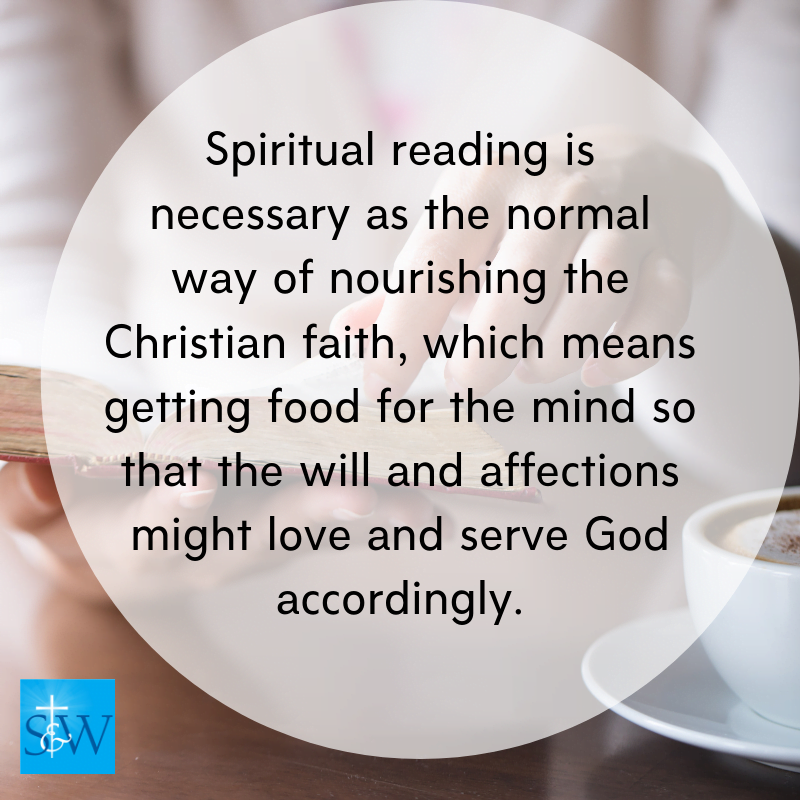The incalculable importance of spiritual reading is the subject of this note. And our conclusion will simply be that spiritual reading is an incredibly important part of the spiritual life, something which we must make time for on a regular basis.
The correlation between spiritual reading and the prayer of meditation is well understood. Spiritual reading is the platform upon which we kindle the logs of meditation, until they flame-up into acts of affective praise, adoration and interior prayer, and when the flames die down, into resolutions for growth in holiness. Of course, on a given day, if we are dry, and we can only manage to muster a few loving aspirations to God, our spiritual reading will still be of great value as our minds are deeply nourished by Catholic truth, and we receive powerful advice from the great spiritual masters on how to overcome our faults and grow in holiness. Spiritual writers sometimes caution us to discern whether our time of meditation has regressed into mere spiritual reading, nevertheless, spiritual reading, in and of itself, is a highly valuable component of the spiritual life! As Father John Hardon observes:

“Spiritual reading is necessary as the normal way of nourishing the Christian faith, which means getting food for the mind so that the will and affections might love and serve God accordingly. I say the normal way, allowing for exceptions that simply prove the rule. We must take the ordinary means to preserve our physical life and the obligation is a grave one. Among these ordinary means none is more basic than food for the body. Without eating the body dies. And it is no comfort to say I am alive now and there is food outside of me. Either that food gets inside of me or I die. Being near me is not enough. I can be surrounded by food and starve. So too we must take the ordinary means to preserve our supernatural life and again the obligation is a grave one. Among these ordinary means none is more basic than food for the mind to nourish the faith. Without food for the mind the faith withers and dies, and there is no mental nourishment for the soul more available and accessible and providable than spiritual reading as just described. Not to nourish the mind, and in the mind the faith, with this food is to tempt Providence, which means to tempt God.”
And the great Father Faber adds this insight about the importance of spiritual reading:
“A person beginning the spiritual life with a taste for reading has a much greater chance of advancing and of persevering than one who is destitute of such a taste. Experience shows that it is really almost equal to a grace. The power of reading,… the taste for reading, [is] one of the most important of all the personal nonsupernatural qualifications for an inward life….He who begins a devout life without it [a taste for spiritual reading] may consider the ordinary difficulties of such a life multiplied in his case at least by ten.”
Still, the important correlation between spiritual reading and mental prayer is duly noted by the great spiritual writers:
“To our mind [spiritual reading] ranks equally with mental prayer and the other exercises of devotion in importance, and, in fact, it is so closely connected with these other exercises, especially the essential one of mental prayer, that without it – unless one finds a substitute, – there is no possibility of advancing in the spiritual life; even perseverance therein is rendered very doubtful” (This Tremendous Lover, p. 101, by Father M. Eugene Boylan).

“The sixth means [to attain solid virtue] is spiritual reading. And we must be very careful in the choice of books. As a rule, we should prefer to all others those which touch the heart….Rodriguez is excellent for beginners. For those who are more advanced, The Imitation of Christ, the writings of Father Surin, Saint Francis de Sales, the Psalms and the New Testament, [and] the ‘Lives of the Saints.’ Our spiritual reading should be half prayer; that is to say, that in reading we should listen to the voice of God, and stop to meditate [engage in mental prayer] when we feel ourselves touched by what we read. We ought to read with a view to practice what we read” (Father Jean Grou, Manual for Interior Souls, p. 16).
“We must regard spiritual reading as being to meditation what oil is to the lamp” – F.W. Faber.
“Spiritual reading…is an intrinsic portion of a devout life, one of its actual and almost indispensable exercises. Prayer is the grand difficulty of most souls. Now, [spiritual] reading feeds and furnishes prayer. It supplies matter. It plants the wilderness. Rightly practiced spiritual reading obviates at least half the difficulties of meditation” – F.W. Faber.
Spiritual reading also tends to have the remarkable capacity to help us in our present needs. “We derive the greatest assistance from [spiritual] reading. Indeed, it is astonishing how pertinent all our reading seems to become when we are in difficulties. It is as if the Holy Ghost, rather than ourselves, had chosen what we should read; and it is he most assuredly who gives it now such a special unction and special message to our souls in their present straits” (Spiritual Conferences, p. 270).
In her excellent book, Am I Living a Spiritual Life?, acclaimed Catholic author, Dr. Susan Muto, urges us to find time each day for spiritual reading. She says: “The possibility of experiencing the touch of God in daily tasks increases in accordance with the time we spend in spiritual reading. The complaint of not having enough time to do spiritual reading might be traceable to an inability to put each aspect of life in its proper perspective. If my primary commitment is the love of God, then I’ll take time to imbibe his word. Professional life is important, but what about all the extras that get added to it? When I look over my day, I find there’s time to do spiritual reading, provided I use my time to the best advantage. We mustn’t forget that the Spirit is capable of illuminating some bland word or trite maxim so that our spirits are transformed in a brief moment of genuine attention [during spiritual reading]” (p.43-44, as edited).
Father Robert Eiten adds the following insights regarding the benefits of spiritual reading:
“Spiritual reading affects both our mind and our will. By spiritual reading our mind is uplifted, spiritually enlightened, given new ideas and new approaches to things; new motives are placed before it or the old ones are refreshed and renewed in our minds. We get new ways of looking at things and old truths are put under new labels. Our will is inspired and strengthened; enthusiasm is aroused in us; appeal is made to our hero instinct and our courage is renewed….Some might object that they have not [the] time for daily spiritual reading. If one is habitually neglecting such reading in general, sooner or later this neglect will show up in his conversation, correspondence, and dealing with others” (A Layman’s Way To Perfection, pp. 88-90).
CONCLUSION: For the reasons stated above it is quite important to set aside time each day for spiritual reading. It is not easy to persevere in the spiritual life, and the great spiritual writers have spoken as if spiritual reading is a necessary component of our perseverance. And frankly: – perseverance is everything! Our spiritual reading is like a road map: it gives us the knowledge and insight we need to safely traverse the hazards of the spiritual journey and to stay on the path that leads to God and eternal life. And as this knowledge enters our minds and hearts it is to be expected that our spiritual reading will become as much prayer and petition as it is a private tutorial for growth in holiness. Without this spiritual road map – that is to say, without a commitment to spiritual reading – we are bound to get lost and confused in the noise of the world which drowns out spiritual life. It is thus important to keep a good Catholic book nearby for daily spiritual reading and nourishment.

I conclude with five (4 available through Signs & Wonders) recommendations for spiritual reading, but there is literally a full library of solid Catholic books to choose from:
- The Imitation of Christ by Thomas a Kempis
- Introduction to the Devout Life by St. Francis de Sales
- The Story of a Soul by St. Therese of Lisieux
- The Creator and the Creature by Father F.W. Faber
- Consoling the Heart of Jesus by Father Michael E. Gaitley
Tom Mulcahy, M.A.
